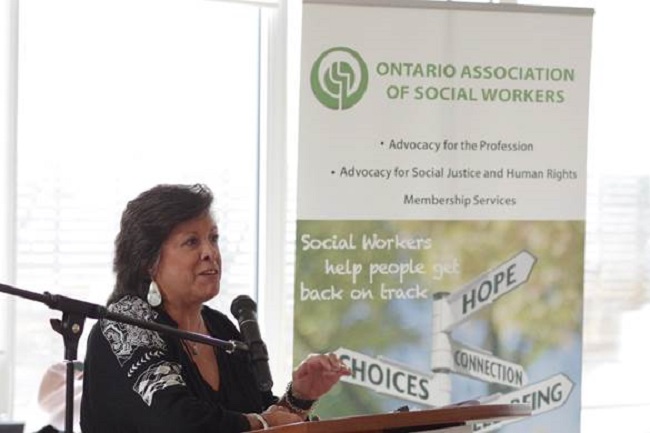‘This is a very important conversation’ says Cynthia Wesley-Esquimaux on reconciliation

By Rick Garrick
THUNDER BAY—Lakehead University Chair of Truth and Reconciliation Cynthia Wesley-Esquimaux emphasized the importance of reconciliation at the Ontario Association of Social Workers Northwestern Branch Annual General Meeting in Thunder Bay.
“This is a very important conversation right across Canada, the whole question of reconciliation, reconciliation as a country, as a region, as a city, as individuals,” says the Chippewas of Georgina Island citizen during her May 8 Truth and Reconciliation: 94 Calls to Action presentation. “It is a very important conversation.”
Wesley-Esquimaux recently completed a conversation with people across Canada as a special representative for Indigenous and Northern Affairs Minister Carolyn Bennett to gather input on reforming the First Nations Child and Family Service program.
“I went to every single province and the Northwest Territories and Labrador,” Wesley-Esquimaux says. “I went to 18 different First Nation communities. I talked to leadership, we talked to delegated agencies, child advocates. The main consideration here, and I put that forward and the minister is aware of it, is the whole question of jurisdiction and authority being restored to communities so they can make decisions on their own behalf and the question of flexible funding so that it’s either block or it’s laterally moveable so that people can put the money where it needs to go.”
Wesley-Esquimaux says that Six Nations currently receives block funding for health care.
“They decide how to spend it,” Wesley-Esquimaux says. “They put it in the right places that they need it, and they’d like to do that same thing with the child welfare piece and I think that is perfectly legitimate.”
Wesley-Esquimaux says her conversation across the country was “very emotional”.
“It was very challenging sitting with people, many times in tears, listening to their stories and working to understand what they needed to have happen to be able to manage their children and their families into the future in a good way,” Wesley-Esquimaux says.
Wesley-Esquimaux raised the comments she received from two Indigenous youth who had aged out of the child welfare system.
“One young fellow told me: ‘On my 18th birthday, I came home from school and my bag was sitting on the step of the house where I had been living, and it was done — I had no money, I had no place to go’,” Wesley-Esquimaux recalls. “One young girl said: ‘I went through the system and I aged out. I had no language, I had no culture, I had no community, I had no relationship with my mother. My father, I don’t know where he is. And essentially I have nothing. Why couldn’t you just help my mother’.”
Wesley-Esquimaux says the system needs to be changed to accommodate the needs of Indigenous people.
“The way it has been structured, the more children you have in care, the more apprehensions that were made, the more resources you got to accommodate that,” Wesley-Esquimaux says. “We want to flip the system on its head, so that more resources go to the communities so they can do the healing and the prevention work and the social workers’ role would actually be to help those communities build that capacity.”
The Northwestern Branch of the OASW includes members from across northwestern Ontario, from White River to the Manitoba border and from the US border to James Bay.

